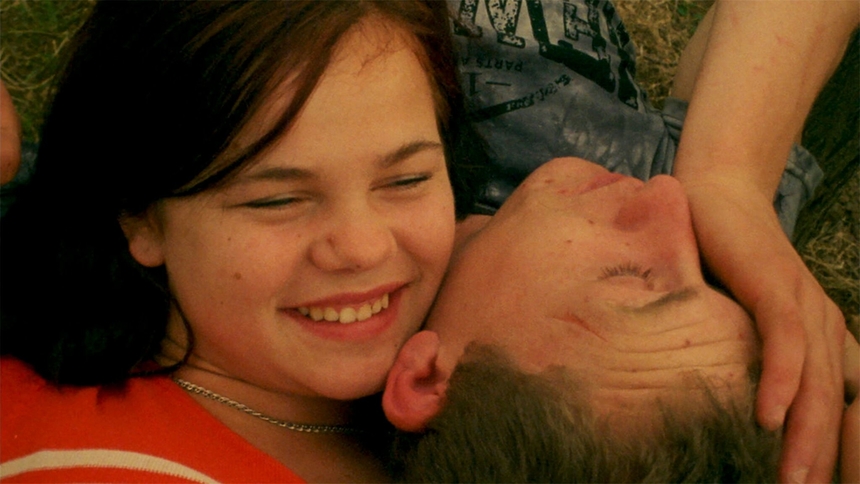Rotterdam 2019 Review: TRANSNISTRA, Intimate, Dreamy Portrait of Youth Stuck in Time and Space

There is an ethereal, evanescent beauty to Anna Eborn's feature-length documentary Transnistra. Six teenagers casually frolic by the river banks in the heat of summer, skipping stones across the water, their silhouettes cast in the pinkish evening glow of the setting sun. On other days, they explore the recesses of abandoned industrial buildings, smoke on rooftops and swing from gymnastic-style still rings on trees in the woods.
Shot in 16mm, it’s the typical picture of an idyllic summer, drenched in warm natural light and still rural landscapes, before transitioning to an unforgiving winter. But these are not teens from just any part of the world. They are a generation stuck in time, inhabitants of a country that does not exist – Transnistria, an unrecognised, landlocked state that split off from Moldova in 1990 after the collapse of the Soviet Union.
Set against this backdrop of uncertainty, Swedish filmmaker Eborn’s documentary gently explores the daily lives, anxieties and dreams of six underprivileged youths in the town of Kamenka, located in the north of Transnistria. Transnistra swept the VPRO Big Screen Award at the 2019 International Film Festival Rotterdam where it made its world premiere, and will be screened commercially across the Netherlands.
Transnistra revolves around the wilful and troubled Tanya, who hangs out with five boys – Tolya, Sasha, Denis, Burulya, and Dima. As the only female in the clique, Tanya is naturally the object of affection among her male friends; she is romantically involved with Sasha (on top of having a boyfriend abroad), while Tolya harbours tentative feelings for her on the side. There’s a playful and flirtatious dynamic among the group; Eborn, who discovered her subjects on the streets, follows them with intimate close-ups that reverberate with the unbridled, reckless and capricious spirit of teens on the cusp of adulthood, but not yet quite ready to grow up.
Yet beneath this carefree atmosphere lies an undercurrent of anxiety and apprehension among her teenage protagonists, whose opportunities for future upward mobility are impeded by their stateless existence. With her documentary Eborn has captured a surreal twilight zone of sorts; an undefined nation still deeply rooted in a Soviet past, where the pursuit of modernity by the young is at odds with a conservative, nationalist community still holding on to outdated ideals. The film’s 4:3 aspect ratio (a model that is becoming an increasing fixture in today’s coming-of-age narratives) fittingly encapsulates the closed-door, limited prospects of her subjects, who are physically cut off from the outside world – the Transnistrian passport is not valid for international travel, though they still have cell phones and Internet access.
We get glimpses of Transnistria’s simple amenities – the surrounding swathes of farmland (agriculture appears to be a key livelihood) alongside largely underdeveloped social infrastructure; ill-advised healthcare professionals in the local hospital direct Tolya, whose physical sight is failing due to a medical condition, to see a psychiatrist instead of an eye specialist.
Tanya and her pals have hazy dreams and hopes, though they pursue them to varying degrees of success. “Nothing changes here,” laments Tanya, who plans to leave the country for greener pastures. “The only thing that’s good here is that it’s peaceful.” Another one of her friends mentions how there is a “shitload” of work to be found in Italy and Greece. Reality is seemingly immutable here, though one way to move up the ranks of society is to join the military – there’s a scene where Tanya’s brother is inducted into the military academy to a room booming with national pride and patriotic rhetoric.
As the six youths in Transnistra search for identity, love and independence, their adolescent struggles and encounters with disappointment neatly parallel the push-pull relationship they share with their motherland, like an on-off lover. There’s a perfect encapsulation of this complex ambivalence in the film’s closing moments, when Tolya croons along to a song: “I am completely mad about you, will you really forget me? I’m afraid I’m not going to return to you. I’m afraid I won’t come back to you.” It’s a haunting, plaintive elegy to a nation in limbo, there but not there.

Do you feel this content is inappropriate or infringes upon your rights? Click here to report it, or see our DMCA policy.






